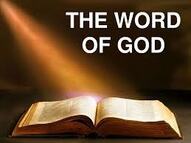"Teach me your ways, O Lord" (Ps. 25: 1). In 2019, Pope Francis declared that "the Third Sunday in Ordinary Time is to be devoted to the celebration, study, and dissemination of the word of God." The Pope's declaration is instructive because the love and knowledge of Scripture are the primary ways to build and strengthen our relationship with Jesus. I love studying the Bible; it has been the source of my enduring faith in God's love and plan for me. As followers of Jesus, called to the life of the Kingdom, the Lord who invites us to communion with him wants to teach us his ways to achieve such union.
We remember, for instance, that the disciples on the way to Emmaus recognized Jesus at the breaking of the bread. But the breaking of bread only came after Jesus taught them from the Hebrew Scriptures about God's plan for his passion, death and resurrection. As Jesus taught them from the oracles of the prophets about his paschal mystery, their hearts were enlightened: "Did not our hearts burn within us while he talked to us on the road, while he opened to us the Scriptures ?" (Lk 24:32).
The Divine Word or Revelation is the perennial truth about God and his revelation. As John wrote in his Gospel, quoting Isaiah 54:13, "They shall all be taught by God" (Jn 6: 45). God himself wants to teach us his will and plans for us. Using the words of the Psalmist, we should often ask the Lord himself to teach us the Scriptures: "Teach me your ways, O Lord. "The words of the Bible are inspired by God even if human writers cooperate with God in putting God's word and will into writing, using literary skills known to them.
In my homily during last Wednesday's morning mass, I encouraged those in attendance to read 1 Samuel 17 about David and Goliath- a story encouraging us to trust in God in the face of any considerable obstacles in our path. Joan Bridgen approached me after mass and promised to read the entire chapter (I made it clear that there would be an exam on Friday morning to test her understanding of the chapter), and John, her husband, asked me questions at breakfast about some difficulties he encountered in his ongoing study of the book of Exodus. I was impressed by their interest in the Bible and intention to wrestle with difficulty understanding it. Some parts of the Bible can be hard to understand sometimes. That should not discourage us from studying and meditating on it. We now have a variety of excellent Catholic Bibles with commentaries available for purchase online.
Will you take up the challenge to do personal and family bible study this year? You don't have to feel intimidated because all you need to do is pray to the Holy Spirit to help you understand and spend time with others, trying to figure out what the Scripture is saying and how you can apply its wisdom to your day-to-day following in the footsteps of Jesus. When we study God's word, He guides us in His ways: "Your word is a lamp for my feet" (Ps 119: 105).
You can learn more about the Lord and his ways by joining other Catholics of the parish in the study of the Bible. Have you considered joining the Bible Study sessions Mike and Berni Rydock lead on Tuesday evenings and Wednesday mornings? You should. What is it that God taught you today in the Liturgy of the Word? His ways? His will? His love? His promises? Consider these questions as you return to the bible passages assigned for our Sunday reading (read Jonah 3: 1-5, 10, Psalm 25, 1 Cor. 7: 29-31, and Mark 1: 4-20).
In less than a month, Lent will begin. Have you started thinking about how to approach prayer, fasting, and almsgiving in the coming Lenten season? You should.
It will be the fifty-first anniversary of the Supreme Court decision, Roe v. Wade, tomorrow, January 22. The church asked us to continue praying for respect for all human life's dignity. I'll celebrate mass for "Giving Thanks to God for the Gift of Human Life" tomorrow, Monday, January 22. All are encouraged to attend.
In Christ,
Fr. Alayode Bernard Oniwe, OP

 RSS Feed
RSS Feed